- Home
- Philip Pullman
His Dark Materials 01 - The Golden Compass Page 15
His Dark Materials 01 - The Golden Compass Read online
Page 15
She hurried up the wooden gangway ahead of Farder Coram, and looked around with excitement. Pantalaimon became a monkey and clambered up the derrick at once, but she called him down again; Farder Coram wanted them indoors, or below, as you called it on board ship.
Down some stairs, or a companionway, there was a small saloon where John Faa was talking quietly with Nicholas Rokeby, the gyptian in charge of the vessel. John Faa did nothing hastily. Lyra was waiting for him to greet her, but he finished his remarks about the tide and pilotage before turning to the incomers.
"Good evening, friends," he said. "Poor Jack Verhoeven's dead, perhaps you've heard. And his boys captured."
"We have bad news too," said Farder Coram, and told of their encounter with the flying spirits.
John Faa shook his great head, but didn't reproach them.
"Where is the creature now?" he said.
Farder Coram took out the leaf tin and laid it on the table. Such a furious buzzing came from it that the tin itself moved slowly over the wood.
"I've heard of them clockwork devils, but never seen one," John Faa said. "There en't no way of taming it and turning it back, I do know that much. Nor is it any use weighing it down with lead and dropping it in the ocean, because one day it'd rust through and out the devil would come and make for the child wherever she was. No, we'll have to keep it by, and exercise our vigilance."
Lyra being the only female on board (for John Faa had decided against taking women, after much thought), she had a cabin to herself. Not a grand cabin, to be sure; in fact, little more than a closet with a bunk and a scuttle, which was the proper name for porthole. She stowed her few things in the drawer below the bunk and ran up excitedly to lean over the rail and watch England vanish behind, only to find that most of England had vanished in the mist before she got there.
But the rush of water below, the movement in the air, the ship's lights glowing bravely in the dark, the rumble of the engine, the smells of salt and fish and coal spirit were exciting enough by themselves. It wasn't long before another sensation joined them, as the vessel began to roll in the German Ocean swell. When someone called Lyra down for a bite of supper, she found she was less hungry than she'd thought, and presently she decided it would be a good idea to lie down, for Pantalaimon's sake, because the poor creature was feeling sadly ill at ease.
And so began her journey to the North.
Part Two
Bolvahgar
Ten
The Consul And The Bear
John Faa and the other leaders had decided that they would make for Trollesund, the main port of Lapland. The witches had a consulate in the town, and John Faa knew that without their help, or at least their friendly neutrality, it would be impossible to rescue the captive children.
He explained his idea to Lyra and Farder Coram the next day, when Lyra's seasickness had abated slightly. The sun was shining brightly and the green waves were dashing against the bows, bearing white streams of foam as they curved away. Out on the deck, with the breeze blowing and the whole sea a-sparkle with light and movement, she felt little sickness at all; and now that Pantalaimon had discovered the delights of being a seagull and then a stormy petrel and skimming the wave tops, Lyra was too absorbed by his glee to wallow in landlubberly misery.
John Faa, Farder Coram, and two or three others sat in the stern of the ship, with the sun full on them, talking about what to do next.
"Now, Farder Coram knows these Lapland witches," John Faa said. "And if I en't mistaken, there's an obligation there."
"That's right, John," said Farder Coram. "It were forty years back, but that's nothing to a witch. Some of 'em live to many times that."
"What happened to bring this obligation about, Farder Coram?" said Adam Stefanski, the man in charge of the fighting troop.
"I saved a witch's life," Farder Coram explained. "She fell out of the air, being pursued by a great red bird like to nothing I'd seen before. She fell injured in the marsh and I set out to find her. She was like to drowning, and I got her on board and shot that bird down, and it fell into a bog, to my regret, for it was as big as a bittern, and flame-red."
"Ah," the other men murmured, captured by Farder Coram's story.
"Now, when I got her in the boat," he went on, "I had the most grim shock I'd ever known, because that young woman had no daemon."
It was as if he'd said, "She had no head." The very thought was repugnant. The men shuddered, their daemons bristled or shook themselves or cawed harshly, and the men soothed them. Pantalaimon crept into Lyra's arms, their hearts beating together.
"At least," Farder Coram said, "that's what it seemed. Being as she'd fell out of the air, I more than suspected she was a witch. She looked exactly like a young woman, thinner than some and prettier than most, but not seeing that daemon gave me a hideous turn."
"En't they got daemons then, the witches?" said the other man, Michael Canzona.
"Their daemons is invisible, I expect," said Adam Stefanski. "He was there all the time, and Farder Coram never saw him."
"No, you're wrong, Adam," said Farder Coram. "He weren't there at all. The witches have the power to separate theirselves from their daemons a mighty sight further'n what we can. If need be, they can send their daemons far abroad on the wind or the clouds, or down below the ocean. And this witch I found, she hadn't been resting above an hour when her daemon came a flying back, because he'd felt her fear and her injury, of course. And it's my belief, though she never admitted to this, that the great red bird I shot was another witch's daemon, in pursuit. Lord! That made me shiver, when I thought of that. I'd have stayed my hand; I'd have taken any measures on sea or land; but there it was. Anyway, there was no doubt I'd saved her life, and she gave me a token of it, and said I was to call on her help if ever it was needed. And once she sent me help when the Skraelings shot me with a poison arrow. We had other connections, too....I haven't seen her from that day to this, but she'll remember."
"And does she live at Trollesund, this witch?"
"No, no. They live in forests and on the tundra, not in a seaport among men and women. Their business is with the wild. But they keep a consul there, and I shall get word to her, make no doubt about that."
Lyra was keen to know more about the witches, but the men had turned their talk to the matter of fuel and stores, and presently she grew impatient to see the rest of the ship. She wandered along the deck toward the bows, and soon made the acquaintance of an able seaman by flicking at him the pips she'd saved from the apple she'd eaten at breakfast. He was a stout and placid man, and when he'd sworn at her and been sworn at in return, they became great friends. He was called Jerry. Under his guidance she found out that having something to do prevented you from feeling seasick, and that even a job like scrubbing a deck could be satisfying, if it was done in a seamanlike way. She was very taken with this notion, and later on she folded the blankets on her bunk in a seamanlike way, and put her possessions in the closet in a seamanlike way, and used "stow" instead of "tidy" for the process of doing so.
After two days at sea, Lyra decided that this was the life for her. She had the run of the ship, from the engine room to the bridge, and she was soon on first-name terms with all the crew. Captain Rokeby let her signal to a Hollands frigate by pulling the handle of the steam whistle; the cook suffered her help in mixing plum duff; and only a stern word from John Faa prevented her from climbing the foremast to inspect the horizon from the crow's nest.
All the time they were steaming north, and it grew colder daily. The ship's stores were searched for oilskins that could be cut down for her, and Jerry showed her how to sew, an art she learned willingly from him, though she had scorned it at Jordan and avoided instruction from Mrs. Lonsdale. Together they made a waterproof bag for the alethiometer that she could wear around her waist, in case she fell in the sea, she said. With it safely in place she clung to the rail in her oilskins and sou'wester as the stinging spray broke over the bows and surged along the d
eck. She still felt seasick occasionally, especially when the wind got up and the ship plunged heavily over the crests of the gray-green waves, and then it was Pantalaimon's job to distract her from it by skimming the waves as a stormy petrel; because she could feel his boundless glee in the dash of wind and water, and forget her nausea. From time to time he even tried being a fish, and once joined a school of dolphins, to their surprise and pleasure. Lyra stood shivering in the fo'c'sle and laughed with delight as her beloved Pantalaimon, sleek and powerful, leaped from the water with half a dozen other swift gray shapes. He had to stay close to the ship, of course, for he could never go far from her; but she sensed his desire to speed as far and as fast as he could, for pure exhilaration. She shared his pleasure, but for her it wasn't simple pleasure, for there was pain and fear in it too. Suppose he loved being a dolphin more than he loved being with her on land? What would she do then?
Her friend the able seaman was nearby, and he paused as he adjusted the canvas cover of the forward hatch to look out at the little girl's daemon skimming and leaping with the dolphins. His own daemon, a seagull, had her head tucked under her wing on the capstan. He knew what Lyra was feeling.
"I remember when I first went to sea, my Belisaria hadn't settled on one form, I was that young, and she loved being a porpoise. I was afraid she'd settle like that. There was one old sailorman on my first vessel who could never go ashore at all, because his daemon had settled as a dolphin, and he could never leave the water. He was a wonderful sailor, best navigator you ever knew; could have made a fortune at the fishing, but he wasn't happy at it. He was never quite happy till he died and he could be buried at sea."
"Why do daemons have to settle?" Lyra said. "I want Pantalaimon to be able to change forever. So does he."
"Ah, they always have settled, and they always will. That's part of growing up. There'll come a time when you'll be tired of his changing about, and you'll want a settled kind of form for him."
"I never will!"
"Oh, you will. You'll want to grow up like all the other girls. Anyway, there's compensations for a settled form."
"What are they?"
"Knowing what kind of person you are. Take old Belisaria. She's a seagull, and that means I'm a kind of seagull too. I'm not grand and splendid nor beautiful, but I'm a tough old thing and I can survive anywhere and always find a bit of food and company. That's worth knowing, that is. And when your daemon settles, you'll know the sort of person you are."
"But suppose your daemon settles in a shape you don't like?"
"Well, then, you're discontented, en't you? There's plenty of folk as'd like to have a lion as a daemon and they end up with a poodle. And till they learn to be satisfied with what they are, they're going to be fretful about it. Waste of feeling, that is."
But it didn't seem to Lyra that she would ever grow up.
One morning there was a different smell in the air, and the ship was moving oddly, with a brisker rocking from side to side instead of the plunging and soaring. Lyra was on deck a minute after she woke up, gazing greedily at the land: such a strange sight, after all that water, for though they had only been at sea a few days, Lyra felt as if they'd been on the ocean for months. Directly ahead of the ship a mountain rose, green flanked and snow-capped, and a little town and harbor lay below it: wooden houses with steep roofs, an oratory spire, cranes in the harbor, and clouds of gulls wheeling and crying. The smell was of fish, but mixed with it came land smells too: pine resin and earth and something animal and musky, and something else that was cold and blank and wild: it might have been snow. It was the smell of the North.
Seals frisked around the ship, showing their clown faces above the water before sinking back without a splash. The wind that lifted spray off the white-capped waves was monstrously cold, and searched out every gap in Lyra's wolfskin, and her hands were soon aching and her face numb. Pantalaimon, in his ermine shape, warmed her neck for her, but it was too cold to stay outside for long without work to do, even to watch the seals, and Lyra went below to eat her breakfast porridge and look through the porthole in the saloon.
Inside the harbor the water was calm, and as they moved past the massive breakwater Lyra began to feel unsteady from the lack of motion. She and Pantalaimon avidly watched as the ship inched ponderously toward the quayside. During the next hour the sound of the engine died away to a quiet background rumble, voices shouted orders or queries, ropes were thrown, gangways lowered, hatches opened.
"Come on, Lyra," said Farder Coram. "Is everything packed?"
Lyra's possessions, such as they were, had been packed ever since she'd woken up and seen the land. All she had to do was run to the cabin and pick up the shopping bag, and she was ready.
The first thing she and Farder Coram did ashore was to visit the house of the witch consul. It didn't take long to find it; the little town was clustered around the harbor, with the oratory and the governor's house the only buildings of any size. The witch consul lived in a green-painted wooden house within sight of the sea, and when they rang the bell it jangled loudly in the quiet street.
A servant showed them into a little parlor and brought them coffee. Presently the consul himself came in to greet them. He was a fat man with a florid face and a sober black suit, whose name was Martin Lanselius. His dsmon was a little serpent, the same intense and brilliant green as his eyes, which were the only witchlike thing about him, though Lyra was not sure what she had been expecting a witch to look like.
"How can I help you, Farder Coram?" he said.
"In two ways, Dr. Lanselius. First, I'm anxious to get in touch with a witch lady I met some years ago, in the fen country of Eastern Anglia. Her name is Serafina Pekkala."
Dr. Lanselius made a note with a silver pencil.
"How long ago was your meeting with her?" he said.
"Must be forty years. But I think she would remember."
"And what is the second way in which you seek my help?"
"I'm representing a number of gyptian families who've lost children. We've got reason to believe there's an organization capturing these children, ours and others, and bringing them to the North for some unknown purpose. I'd like to know whether you or your people have heard of anything like this a going on."
Dr. Lanselius sipped his coffee blandly.
"It's not impossible that notice of some such activity might have come our way," he said. "You realize, the relations between my people and the Northlanders are perfectly cordial. It would be difficult for me to justify disturbing them."
Farder Coram nodded as if he understood very well.
"To be sure," he said. "And it wouldn't be necessary for me to ask you if I could get the information any other way. That was why I asked about the witch lady first."
Now Dr. Lanselius nodded as if he understood. Lyra watched this game with puzzlement and respect. There were all kinds of things going on beneath it, and she saw that the witch consul was coming to a decision.
"Very well," he said. "Of course, that's true, and you'll realize that your name is not unknown to us, Farder Coram. Serafina Pekkala is queen of a witch clan in the region of Lake Enara. As for your other question, it is of course understood that this information is not reaching you through me."
"Quite so."
"Well, in this very town there is a branch of an organization called the Northern Progress Exploration Company, which pretends to be searching for minerals, but which is really controlled by something called the General Oblation Board of London. This organization, I happen to know, imports children. This is not generally known in the town; the Norroway government is not officially aware of it. The children don't remain here long. They are taken some distance inland."
"Do you know where, Dr. Lanselius?"
"No. I would tell you if I did."
"And do you know what happens to them there?"
For the first time, Dr. Lanselius glanced at Lyra. She looked stolidly back. The little green serpent daemon raised her head from
the consul's collar and whispered tongue-flickeringly in his ear.
The consul said, "I have heard the phrase the Maystadt process in connection with this matter. I think they use that in order to avoid calling what they do by its proper name. I have also heard the word intercision, but what it refers to I could not say."
"And are there any children in the town at the moment?" said Farder Coram.
He was stroking his daemon's fur as she sat alert in his lap. Lyra noticed that she had stopped purring.
"No, I think not," said Dr. Lanselius. "A group of about twelve arrived a week ago and moved out the day before yesterday."
"Ah! As recent as that? Then that gives us a bit of hope. How did they travel, Dr. Lanselius?"
"By sledge."
"And you have no idea where they went?"
"Very little. It is not a subject we are interested in."
"Quite so. Now, you've answered all my questions very fairly, sir, and here's just one more. If you were me, what question would you ask of the Consul of the Witches?"
For the first time Dr. Lanselius smiled.
"I would ask where I could obtain the services of an armored bear," he said.
Lyra sat up, and felt Pantalaimon's heart leap in her hands.
"I understood the armored bears to be in the service of the Oblation Board," said Farder Coram in surprise. "I mean, the Northern Progress Company, or whatever they're calling themselves."
"There is at least one who is not. You will find him at the sledge depot at the end of Langlokur Street. He earns a living there at the moment, but such is his temper and the fear he engenders in the dogs, his employment might not last for long."
"Is he a renegade, then?"
"It seems so. His name is Iorek Byrnison. You asked what I would ask, and I told you. Now here is what I would do: I would seize the chance to employ an armored bear, even if it were far more remote than this."

 The Golden Compass
The Golden Compass The Ruby in the Smoke
The Ruby in the Smoke I Was a Rat!
I Was a Rat! Once Upon a Time in the North
Once Upon a Time in the North The Tiger in the Well
The Tiger in the Well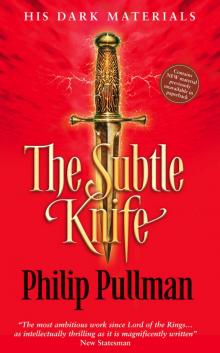 The Subtle Knife
The Subtle Knife The Butterfly Tattoo
The Butterfly Tattoo Lyra's Oxford
Lyra's Oxford The Broken Bridge
The Broken Bridge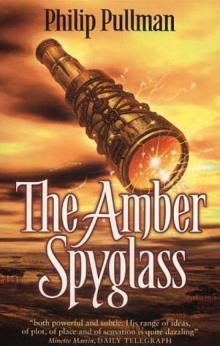 The Amber Spyglass
The Amber Spyglass Count Karlstein
Count Karlstein The Scarecrow and His Servant
The Scarecrow and His Servant The Shadow in the North
The Shadow in the North The Collectors
The Collectors The Good Man Jesus and the Scoundrel Christ
The Good Man Jesus and the Scoundrel Christ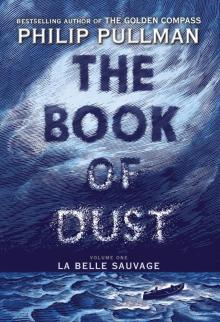 La Belle Sauvage
La Belle Sauvage The Tin Princess
The Tin Princess The Firework-Maker's Daughter
The Firework-Maker's Daughter The Book of Dust: The Secret Commonwealth (Book of Dust, Volume 2)
The Book of Dust: The Secret Commonwealth (Book of Dust, Volume 2) Serpentine
Serpentine Daemon Voices
Daemon Voices The Amber Spyglass: His Dark Materials
The Amber Spyglass: His Dark Materials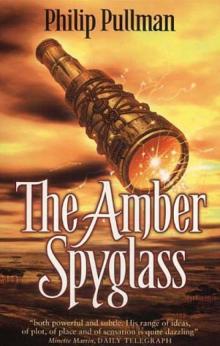 The Amber Spyglass hdm-3
The Amber Spyglass hdm-3 The Haunted Storm
The Haunted Storm The Golden Key
The Golden Key His Dark Materials 01 - The Golden Compass
His Dark Materials 01 - The Golden Compass Fairy Tales from the Brothers Grimm: A New English Version
Fairy Tales from the Brothers Grimm: A New English Version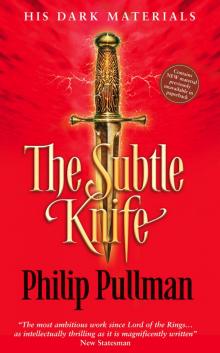 His Dark Materials 02 - The Subtle Knife
His Dark Materials 02 - The Subtle Knife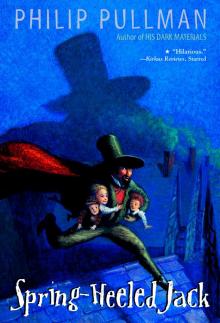 Spring-Heeled Jack
Spring-Heeled Jack The Golden Compass hdm-1
The Golden Compass hdm-1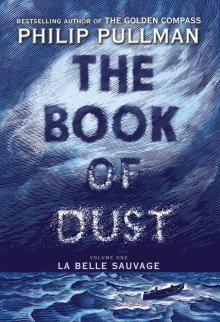 The Book of Dust, Volume 1
The Book of Dust, Volume 1 Two Crafty Criminals!
Two Crafty Criminals! Fairy Tales from the Brothers Grimm
Fairy Tales from the Brothers Grimm The Subtle Knife: His Dark Materials
The Subtle Knife: His Dark Materials His Dark Materials Omnibus
His Dark Materials Omnibus The Golden Compass: His Dark Materials
The Golden Compass: His Dark Materials The White Mercedes
The White Mercedes